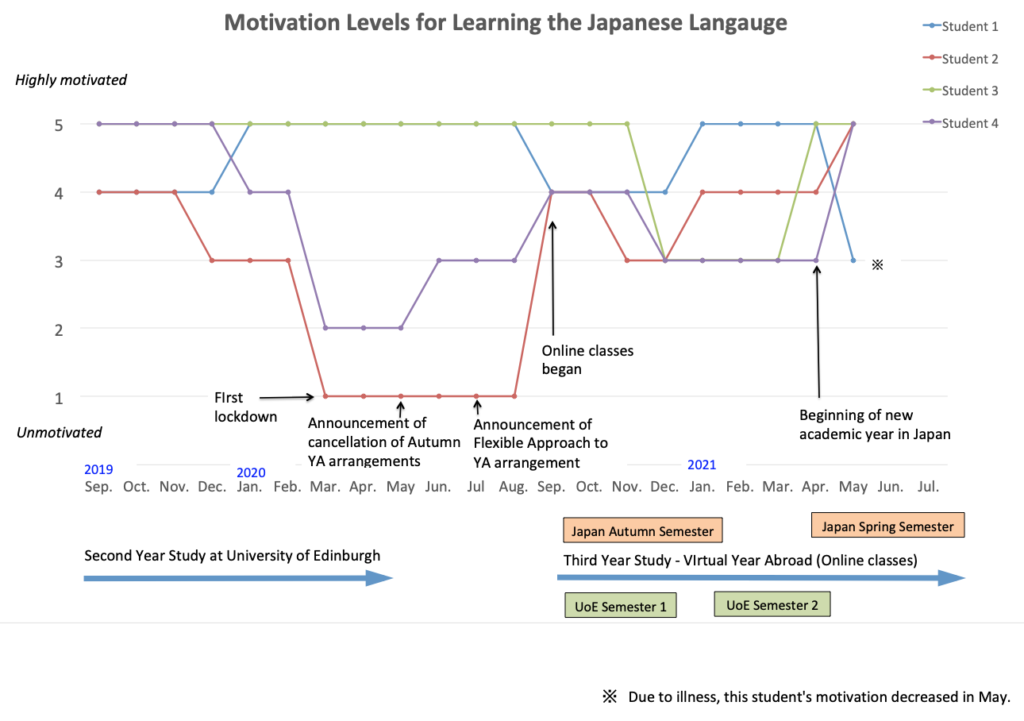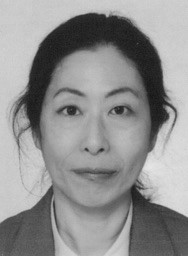
In this post, Fumiko Narumi-Munro, Atsuko Moriyama and Helen Parker, from the Asian Studies department, address the following question: When the year abroad is cancelled due to a global pandemic, what can be offered to language degree students with a compulsory year abroad as a part of their degree programme? This post is part of the January and February Learning & Teaching Enhancement Theme: Online/hybrid enhancements in teaching practice.
So far, in the Asian Studies department of the School of Literatures, Languages and Cultures, three cohorts of Japanese degree students have been affected by the pandemic. We asked ourselves if it was better to arrange online tuition from institutions in the host country even though there is a large time difference (8-9 hours), or to create a completely new teaching programme by ourselves instantly without any additional resources? This post explores these questions.
Background
When the first lockdown started in March 2020, the third-year cohort of Japanese degree students were in Japan on a mandatory year abroad (YA), which was curtailed mid-way through.
The YA is at the heart of language degrees, and plays a major role in the students’ language learning (QAA Subject Benchmark Statement). Without it, how can our students achieve the same level of the language? How do they meet the learning outcomes for the Honours years?
The third-year curriculum at Edinburgh has never had any established language courses that meet the same learning outcomes and language level, which could be considered a viable replacement for the YA.
As it was an emergency, language teaching staff at many UK universities were asked to develop and provide substitute online tuition with very short notice, and little support or guidance from their institutions.
Setting up J-YAP IUSP
In desperation, the YA coordinators of the seven UK institutions from Japan Year Abroad Programme Coordinator Network (J-YAP) – which we are part of – launched ‘J-YAP Inter-University Support Programmme’ (IUSP) in April 2020 to set up a common teaching platform and develop co-teaching resources to provide alternative language tuition to those students. The initial idea was to share the burden so that affected students could be taught along with those from other universities by teachers participating in IUSP. The platform to offer this online tuition was built in May-June 2020.
Since the tuition started in July 2020, language, cultural sessions and lectures have been offered by IUSP project members and Japanese Studies lecturers; career talks have been delivered by the participating institutions’ graduates and British diplomats; and group discussions and language exchanges have been organised with Japanese students.
IUSP has also been offering regular language tuition with funding from the Embassy of Japan in the UK and The Japan Foundation via the British Association for Teaching Japanese as a Foreign Language.
During the pandemic, Edinburgh students have been encouraged to take IUSP classes/sessions as additional study on top of online language tuition offered by our partner universities in Japan. In online classes of both Japanese universities and IUSP, our students are taught alongside students from other institutions. This would naturally happen on an exchange programme at a host institution on the YA.
In reflecting on this new way of teaching, we had some questions we wanted to explore: Do our students see this substitute YA experience as a positive experience, and value interacting with new people, or do they find it uncomfortable to be taught with students from other institutions whose language learning background is different? How does this experience affect their language learning and motivation to study?
The impact of virtual/digital year abroad tuition
Our recent PTAS project sought to answer these questions. We investigated the impact of virtual/digital YA tuition, from both IUSP and Japanese universities, on the Edinburgh students of Japanese degrees. We conducted an online survey and a follow-up interview for the 2020-21 third-year cohort. Although there weren’t many participants (five out of the 15 students answered the questionnaire, and four of them agreed to an interview), what we found was very interesting, and produced both expected and unexpected results.
The major issues of the “virtual/digital year abroad” for Japanese language degrees are the different semester periods and the time difference between UoE/UK and Japan. Japanese universities’ spring semester runs from April to August unlike institutions in the UK, where spring semester usually starts in January and ends before summer. If we want to provide a similar experience to the physical YA at host universities in Japan, the alternative second-semester tuition must be offered for much longer.
Online tuition organised by host universities in Japan is typically offered during anti-social hours (e.g. 3am) due to the time difference between Japan and the UK. This has been the biggest issue, and some students have been suffering from mental health issues due to sleep deprivation. IUSP classes were organised during UK daytime, but the online language tuition from Japanese universities was the only official YA replacement, whereas J-YAP classes were only additional sessions. This discouraged many students from participating in J-YAP classes because it disrupted their sleeping patterns. These issues were anticipated even before we conducted the survey and interviews.

What surprised us in the interviews was students’ comments concerning their motivation for learning Japanese. We feared that they would be in despair and lose their motivation completely during the first lockdown, particularly when they learnt their physical YA was cancelled. Obviously, the motivation level of some students was low during the lockdowns, but in some cases, it remained high during the same period. Their motivation went up when the virtual/digital YA, particularly with online tuition from a Japanese university, started.
Another surprise was that the students felt they benefited from the virtual/digital YA to improve their language skills, and this is not only their own perception. The language level they have achieved through the virtual/digital YA is not particularly inferior to those who completed their YA physically (see below).

These findings suggest that the virtual/digital YA for this cohort was successful in general despite the time difference, and the different semester timing.
Reflection and future direction
Although Covid vaccination programmes have been in place in both UK and Japan, YA in Japan still cannot resume as the border is still closed (as of January 2022) even though some other countries and YA experiences are now open to students from the UK.
The current YA students are the third cohort, but the time difference issue still has not been addressed fully. Although it is an improvement that IUSP classes are now a part of the official alternative arrangements for those who cannot cope with the midnight classes, the regular classes from IUSP will be offered only by the end of March due to funding issues, and there will be fewer classes from April. If Japan does not open the border even after April, we must make another alternative plan, and perhaps this will involve more inter-university contributions and collaborations to support IUSP.
Notes
Sakie Chiba-Mooney and Akihiko Shimizu also contributed to our PTAS project.
 Fumiko Narumi-Munro
Fumiko Narumi-Munro
Fumiko is Japanese Language Programme Director and Year Abroad Coordinator at Asian Studies, School of Literatures, Languages and Cultures. She teaches Japanese language to undergraduate students (Years 1 to 4). She also took part in the e-Learning project HANABI in 2009-10 as the Project Coordinator. She has been one of the project members of IUSP (J-YAP Inter-University Support Programmme) along with other six Japan Year Abroad Coordinators from other UK institutions.
 Atsuko Moriyama
Atsuko Moriyama
Atsuko is a full-time staff member of Asian Studies, School of Literatures, Languages and Cultures, and currently teaches Japanese language to all year levels. Before taking up this position, she supervised dissertations in MSc TESOL and MSc in Language Teaching at Moray House, having been motivated to practise research-informed teaching. She was awarded external grants for her classroom-based research and for developing study abroad programmes for undergraduates at Chiba University in Japan and those at its sister universities around the world.
 Helen Parker
Helen Parker
Helen is a Lecturer in the School of Literatures, Languages and Cultures, and is currently head of subject area for Japanese. She is course organiser for the MA Honours core course in Translation from Japanese to English, and teaches various option courses in literature and performing arts. In her undergraduate teaching, she is interested in exploring ways to integrate Japanese language learning with the study of Japanese culture.

